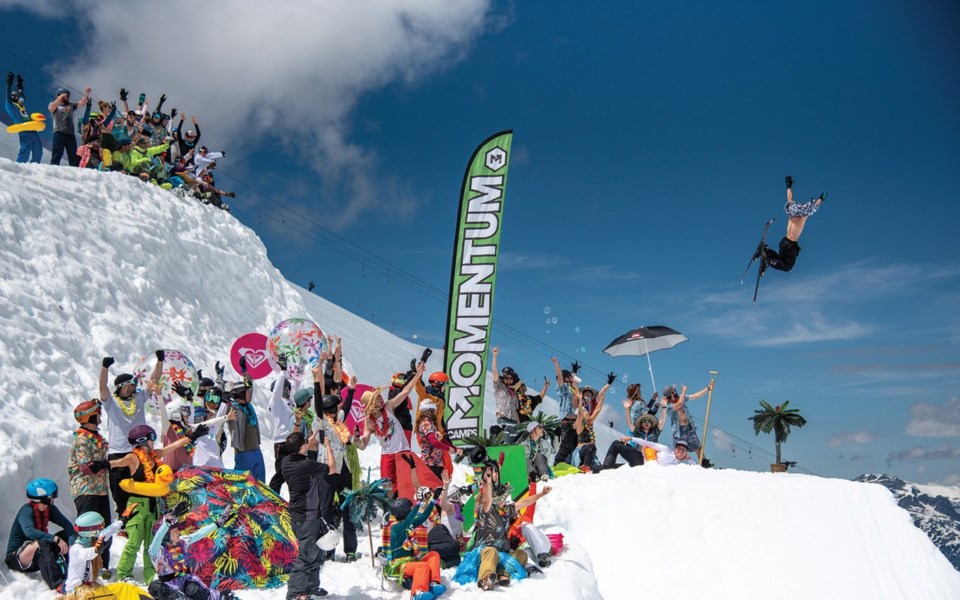As the cycle of COVID-19 cancellations continues, news on June 1 that Whistler Blackcomb (WB) will not be allowing glacier skiing or riding this summer wasn't entirely unexpected—but that didn't take the sting off the disappointment.
"Devastating, all around, but I guess I can't say I'm totally surprised," said John Smart, director of Momentum Ski Camps, when asked for his reaction.
Momentum was gearing up for its 29th summer running freestyle, skiing, big mountain and snowboard camps on Blackcomb's Horstman Glacier when the news came down.
"We've been running for 29 years, every single year ... we're not used to having a year off," Smart said with a laugh.
"This is a totally different world, and we're not used to telling these guys they can't come to camp and go skiing. It's a tough one."
While COVID-19 restrictions meant Momentum's international clientele—who make up about 70 per cent of the 800 or so athletes the company welcomes each year—were effectively shut off from the resort, Smart said the summer could still have been viable based on demand from Canadians alone.
"We started to realize that everyone in Canada was so desperate to ski, because they missed out on the spring training, that we had buy-in from every single team, and calls from them saying, 'hey, we really need you guys to be up and running because you're our only option right now,'" Smart said.
"And then the decision came down ... it was crushing on us."
The news was dropped in an email to WB staff on June 1, in which WB chief operating officer Geoff Buchheister announced there would be no glacier skiing or riding this summer due to COVID-19.
"I know many of you, along with some of the biggest names in our sport, have fond memories of participating in summer glacier camps," Buchheister said.
"I am disappointed we are unable to offer glacier skiing and riding this summer. I do not take the decision lightly and understand the impact it will have on the businesses who operate camps on the glacier, but, first and foremost, our priority has to be on planning for a safe summer operation."
Glacier access "adds a layer of complexity over an already complex situation," he added.
"By narrowing our focus to our summer operation, we can ensure that our team is preparing a plan that is careful, measured and realistic, while in keeping with provincial health guidelines," he said.
"We need to get it right for the sustainability of our business and community. I'll have more to share on that summer plan in the coming weeks, along with an opening date."
The decision from Vail Resorts is disappointing on a number of levels, said Josh Dueck, executive director of Freestyle BC, which works with national and provincial athletes on the glacier.
"This is one of our last opportunities to create a really positive technical training for both alpine and freestyle to be competitive on a world stage, and without our athletes being able to travel internationally to find snow—and now that our last bit of snow has been shut down, or is not opening up—that puts Canada at a real disadvantage globally," Dueck said, adding that the glacier is also typically used by 25 or so of the province's best skiers for summer training.
"It totally compromises their opportunity to stay competitive across the country, and earn those spots on the national team which they're working for ... it puts us back."
On a local level, the Whistler Mountain Ski Club (WMSC) has a long history of using the glacier, and depends on it for a form of income and employment for coaches, Dueck said (though he was not speaking on behalf of the club; an interview request to the WMSC was not returned before Pique's deadline).
"And then I suppose the fourth level of disappointment is simply the human factor," he said. "I would have loved to have seen this opportunity for all kids, and adults really, to have some fresh air and a new perspective on top of the mountain, if you will, during these trying times."
As for the longer-term impacts COVID-19 will have on high-level skiing and boarding in B.C., "nobody knows," Dueck said.
"We're all sharing in that—what will the next couple of years really look like in the ecosystem of sport right now—and I don't know. I don't even want to speculate," he said.
"Now we've just got to be creative. We haven't lost hope. We're certainly looking at other opportunities to provide some technical training for our athletes and really engage them in different ways."
For Smart, the off year is an opportunity to fine-tune Momentum's automated registration and digital marketing while preparing for what's sure to be a big year in 2021.
"You never know the impact on you until it's taken away ... then you start to realize, 'Holy crap, do we ever have a cool product up there,'" Smart said. "And that almost drives us more, because the feedback from everyone has been, 'Man, 2021 is going to be a big one.'"




